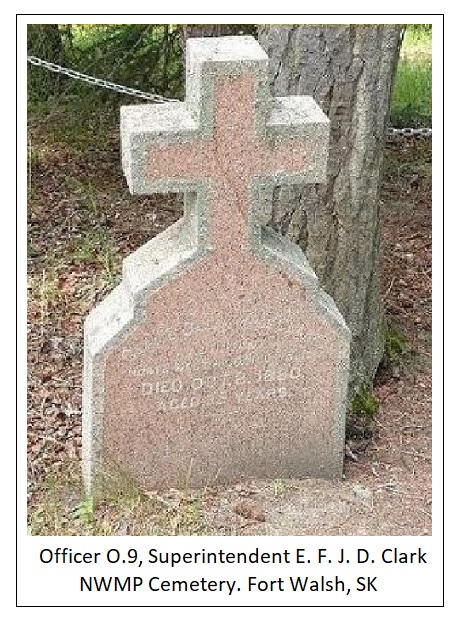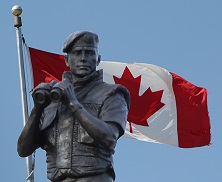True and Fascinating Canadian History

Vet of the Month: July, 2021
The NWMP: In Sickness and in Health
RCMP Vets. Ottawa, ON

In the early days of the NWMP, including the time of the March West in 1874 and for several years afterwards, the men had sufficient cause to complain. In many cases, their general health was poor, they were vulerable to on the job injuries such as falls, horse kicks, spills or sprains, and they had little support to meet their general health and psychological needs. Some recruits were hired with preexisting medical conditions such as poor lungs or a weak heart. Sub-Constables John Wilson and Herbert Gilman come to mind. After being hired, recruits discovered that food was meagre and malnutritious, unsanitary conditions existed in camp and in the barracks, and there was a lack of soap and water. There were no showers. Clean drinking water was at a premium. Constant caring for the horses and animals and the construction of roads, forts and out-buildings required men to be able-bodied and in top physical condition. Many men were not accustomed to the strenuous demands of this variety of work on their body. Aches and pains were common. Few days, if any, were filled with glamour for the average NWMP.

In his famous book written in 2017 entitled, The North West Mounted Police 1873 to 1885, Canadian author Jack Dunn chronicled the unsanitary conditions under which the men lived, Dunn wrote, "Superintendent J. Walsh had Doctor Robert Miller (on his arrival at Fort Walsh in November, 1875) inspect the Detachment. Miller reported that it was necessary to recommend that all the men of the Detachment wash themselves all over at least once a week using lots of soap and water. Nonetheless, the lack of such basic facilities hampered cleanliness." (Dunn: 547). The lack of showers undoubtedly lead to dirt blocking sweat glands on their skin which only exacerbated acne, psoriasis, dermatitis, and other dermalogical irritants. Early NWMP doctors did not have the advanced knowledge and expertise or the ointments to treat these common health conditions.

All of these health factors, as well as cramped living quarters, brought on conditions such as depression and behavioural disorders, and illnesses like diarrhea, dysentery, and typhoid fever. Dentists were scarce and many of the NWMP likely suffered from tooth decay and severe nerve pain. Looking back at the early lives of the NWMP, one has to be sympathetic and compassionate. They faced difficult days filled with severe loneliness and this too may have been a contributing factor leading to widespread alcoholism. It is only speculation, but the high desertion rate within the ranks of the NWMP may have been linked directly to the requirement for strenuous physical labour.
Over the spell of several years, it became obvious that many of the recruits could not sustain the rigours of long hours day after day and the heavy workload. Author Jack Dunn wrote, "In 1880, [Doctor] Kennedy concluded from his examination of 100 recruits that although the large majority of them were splendid specimens of Canadian manhood about one-fourth were still developing and lacked both the stamina and endurance necessary for the manual task of policing." (Dunn: 549). In light of Dr. Kennedy's observations, the age at time of engagment into the NWMP was raised from nineteen to twenty-one years of age. Other NWMP doctors wanted the age to be raised to twenty-three.

Recruit Sub Constable John Wilson joined the NWMP in July, 1876, but his career was cut short for medical reasons. Wilson was not assessed truthfully by an Ontario physician, although it became evident that Wilson used an, "excess of stimulants." (Dunn: 548). After his engagement into the NWMP, it was discovered that Wilson had severe limitations to physical work. The NWMP Medical Officer, Dr. Kittson reported that Wilson, "...appears on daily sick list reports as suffering from chorea (St Vitus Dance) with muscular spasms, declined debilitating [sic] and is unfit to undergo the slighest fatigue." (p.548). After just 10 months service, John Wilson was given a medical discharge from the NWMP.
John Wilson was not the only recruit to receive less than an honest medical assessment from his doctor at the time of engagement. Interestingly, the first medical report for Sub Constable Herbert Gilman read, "...heart and lungs healthy, no blemishes of any kind, good physical development, capable of hard work." (Dunn: 548). Later at Fort Walsh, however, it turned out that Gilman was a very sick man. Dr Kittson diagnosed him as being, "in a tubercular and debilitated condition." Further, Dr. Kittson noted that, " ...the previous fall the recruit [Gilman] has suffered resulted in a severe attack of inflammation of the lungs." (Dunn: 548). Herbert Gilman was assessed as surely not capable of physical labour and he too was given a medical release from the NWMP.

But, Sub Constables Wilson and Gilman were not exceptions when it came to poor health and their unsuitability for a police career. More than a few dozen other NWMP were also released on medical grounds, and the data for the men who died early in life or unexpectedly was unusually high. Author Jack Dunn provided a statistical breakdown of early deaths among the NWMP, Dunn wrote, "In the years 1874-85, thirty-eight NWMP died. Typhoid fever and military action with eight deaths each, were the leading cause of death. Drowning claimed six lives. Three of the eight typhoid fever deaths were related to the '74 March. Unsanitary water at Fort Walsh took the lives of Superintendent E. Dalrymple Clark in 1880 and Constable A. E. C. Tonkin in November, 1882." (Dunn: 550). Water is an essential requirement to sustain life and the NWMP had no other choice but to drink whatever water was available and then hope they would not be infected. Nethertheless, some men did die from dirty drinking water.

All kinds of other health related cases led to death among the NWMP. Author Jack Dunn wrote, "From 1873 to 1885; Accidental gunshot accounted for two deaths, Asthma one death, Drownings six deaths, Hypothermia three deaths, Hemorrage three deaths, Military action eight deaths, Natural causes two deaths, Murder one death, Septicemia one death, suicide two deaths, Typhoid eight deaths, Dysentery one death, and workplace accidents three deaths. (Dunn: 554-555). The victims were all young police officers. There were several other recorded deaths among the NWMP but the precise cause of death was not made public.
Amidst all of the priorities in one's life, it is also important to reflect occasionally on the lives of the pioneers who went west and settled Canada. All of these early settlers deserve to be remembered. The NWMP led difficult lives under tremendously difficult circumstances, and many of them died prematurely brought on by a variety of illnesses or disease. Others were left with lifelong injuries. The first NWMP recruits were not perfect, but they did their duty as best they could, and they all made sacrifices so that future generations of Canadians would benefit from a peaceful, welcoming and stable country.
Reporting from Fort Healy,
J. J. Healy
July 23, 2021
Dunn, Jack E. (2017). The North West Mounted Police 1873 to 1885. Jack E. Dunn Publisher. Calgary, AB.






